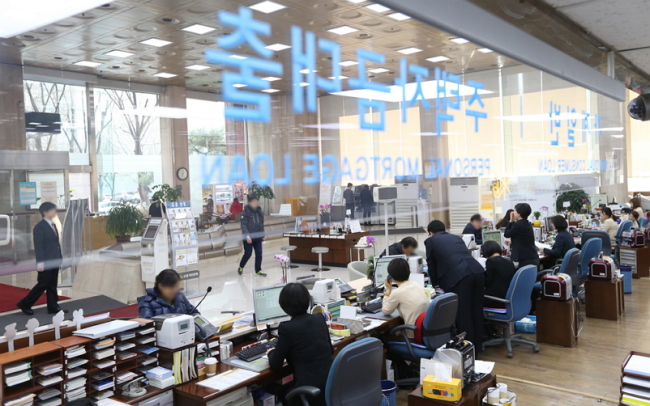Banks’ mortgage loans grew at record pace during the first two months of this year, indicating that the high “jeonse” rates and low loan interest rates were pushing people to buy their homes.
The outstanding balance for housing mortgage loans by seven top-ranking banks here amounted to 319.9 trillion won ($291 billion) as of the end of February, up 3.45 trillion won from the end of last year, according to industry officials Sunday.
This was 8.2 times the increase recorded during the same period last year, as well as the steepest increase for the first two months of a year.
The surge was more conspicuous in February, when the increase was 2.5 trillion won, up 109 percent from the same period a year earlier.
 |
Bank employees provide consultations at a local bank in Seoul. (Yonhap) |
Observers also pointed out that the average amount lent per day was much higher, as banks operated for only 17 days in February this year because of the five-day Lunar New Year holiday.
Park Won-kap, a senior real estate researcher at KB Kookmin Bank, said that bank mortgage lending would continue to rise as jeonse rates were likely to remain high.
“The rapid surge in jeonse, or lump-sum deposits for home leases, pushed house hunters to take out low-rate loans to purchase homes, rather than to lease them,” Park said.
According to the bank, the nation’s average jeonse rate, indicating the jeonse deposit price as opposed to purchasing price, reached a record high of 70.6 percent last month. The given figure has been rising for 22 months straight since April 2013 and surpassed the 70 percent barrier in January this year.
But concerns are rising on the already high level of household debt, which may reduce consumer spending and consequently drag down the overall economy.
Last year, as a combined result of slow growth and the government’s deregulation on lending, household debt amounted to a record 1,089 trillion won, up 67.6 trillion won from the previous year.
By Bae Hyun-jung (
tellme@heraldcorp.com)





![[Exclusive] Hyundai Mobis eyes closer ties with BYD](http://res.heraldm.com/phpwas/restmb_idxmake.php?idx=644&simg=/content/image/2024/11/25/20241125050044_0.jpg)
![[Herald Review] 'Gangnam B-Side' combines social realism with masterful suspense, performance](http://res.heraldm.com/phpwas/restmb_idxmake.php?idx=644&simg=/content/image/2024/11/25/20241125050072_0.jpg)

